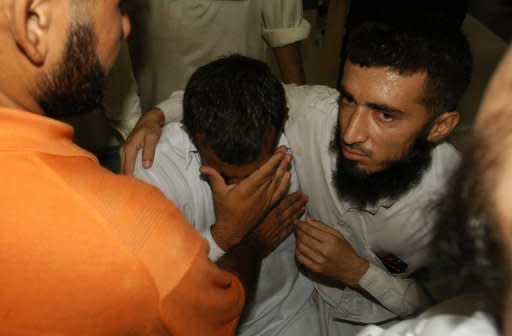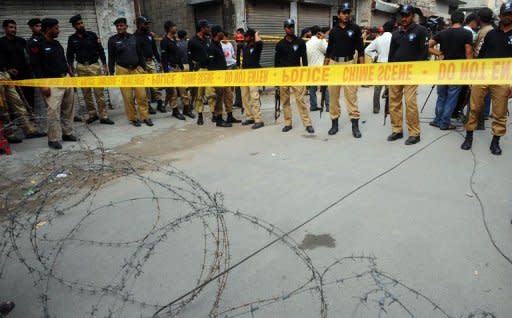Gunmen kill nine police in Pakistan's Lahore
Gunmen shot dead nine Pakistani police prison staff on Thursday as they slept, the second attack on security forces in the country's political heartland since Islamabad reopened a NATO supply corridor. The Pakistani Taliban claimed responsibility for the dawn raid, in which gunmen stormed a hostel in Pakistan's second largest city of Lahore where officers being trained from the troubled northwest were staying. The killings, and a similar assault on an army camp Monday, raise fears of renewed violence in Punjab, the country's most populous province vital in upcoming elections, and which for the past year had seen a lull in Taliban attacks. Punjab police chief Habibur Rehman said the attackers came on three motorcycles and one car, armed with Kalashnikov rifles and hand grenades. They then stormed the building in the densely populated area of Ichra, where around 30 police prison staff were sleeping early Thursday. One survivor told AFP from his hospital bed that staff jumped frantically onto the roof tops of neighbouring houses to escape the hail of bullets. "About 15 of us were sleeping on the roof and some were offering prayers when gunfire started downstairs. Some of my colleagues who went down to see what was happening were killed or wounded," Mohammad Rizwan Shah, 23, told AFP. He said he works in the prison in the northwestern city of Peshawar, which houses Taliban and other Islamist militants, and came to Lahore six weeks ago for a training course due to end on July 28. "I jumped over to the house next door to save my life and fractured my arm. Others too jumped walls and into neighbouring houses," he said. A spokesman for the rescue service said eight other people were wounded and that there had been no security outside the building, which was not an official police residential property. Police said the victims were shot as they slept on mats, now soaked with blood. Local resident, Mohammad Siddiq, 43, said he saw gunmen fleeing on motorcycles and a blood-drenched body lying in the street at around 5:30 am (0030 GMT). Pakistan's main umbrella Taliban faction claimed responsibility. Spokesman Ehsanullah Ehsan told AFP in a telephone call that the attack proved "no place is beyond our reach". He said five attackers targeted the policemen because Taliban inmates were tortured in prisons in the northwest and said the raid was "part of chain of attacks" that started in Punjab's district of Gujrat on Monday and would continue. Police also blamed the "same gang" who killed seven security personnel at an army camp in Gujrat, 150 kilometres (100 miles) southeast of Islamabad, on Monday. Considered Pakistan's cultural capital and close to the Indian border, Lahore is a city of eight million that in 2010 suffered a string of high-profile bombings blamed on Taliban and Al-Qaeda-linked militants. But since early 2011, it had been largely shielded from violence linked to the Islamist extremists based in Pakistan's border regions with Afghanistan in the northwest. Tensions have been high among right-wing and extremist organisations since Pakistan last week decided to reopen its Afghan border to NATO supply convoys, ending a seven-month blockade following negotiations with US officials. The Defence Council of Pakistan, a coalition of right-wing and hardline Islamist groups opposed to the country's alliance with Washington, has led protests against the resumption of supplies for NATO troops fighting the Taliban in Afghanistan. Just hours before Monday's attack, thousands from the Defence Council of Pakistan passed through Gujrat on a protest march from Lahore to Islamabad.Pakistan closed the routes in protest at US air strikes in November last year that killed 24 Pakistani soldiers. The air strikes plunged ties between Islamabad and the United States, already shaky after the US killing of Osama bin Laden in a Pakistani garrison town in May 2011, to a new low. After months of negotiations, a rapprochement was achieved when US Secretary of State Hillary Clinton apologised for the November deaths.






